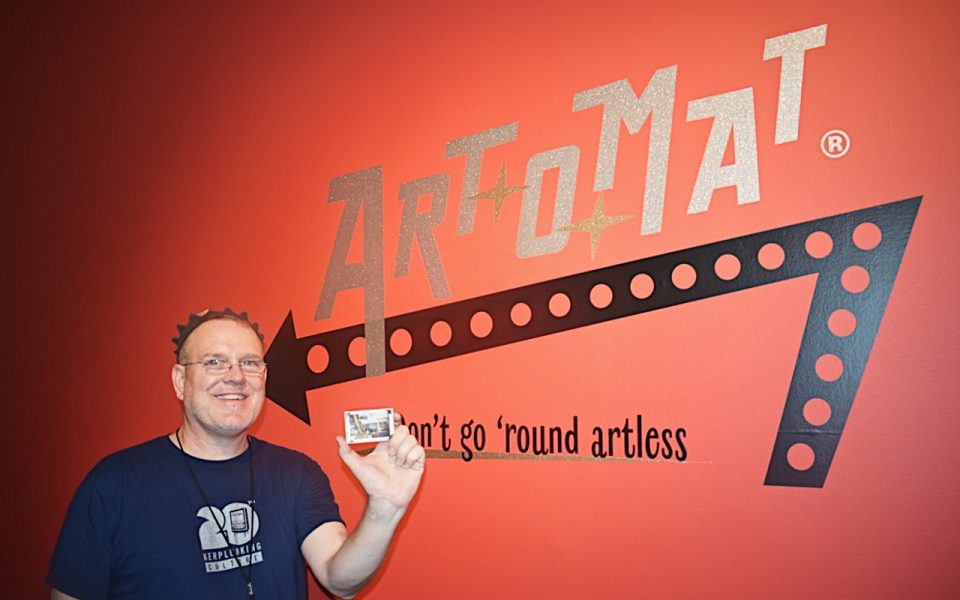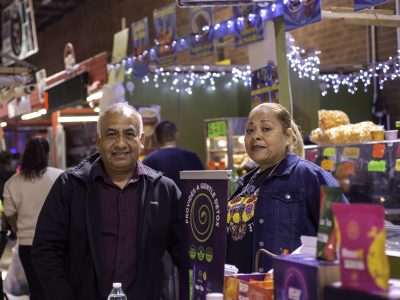Clark Whittington is a pack-rat. He couldn’t tell you just how many Art-o-mat blocks have found homes in his dusty basement but as of mid-April, they’re on proud public display.
In 1997, the Winston-Salem-based artist created Art-o-mats: vintage cigarette vending machines repurposed to dispense small works of art, a fitting metaphor for the city’s transformation from tobacco town to flourishing center of arts and innovation.
On June 10, hundreds of people of all ages gathered for a “swap meet” at SECCA, where more than 60 artists traded creations purchased from the old machines. The afternoon event featured live bands and food trucks on the grounds. Indoors, the main galleries buzzed with chatter as artists crafted and sold previous works.
Local participant and artist Sharon Hardin, 63, teaches drawing and design at Salem College. She decided to experiment with the Art-o-mat format about three years ago and loosely bases her cigarette box-sized watercolors on botanicals.
Art-o-mat makes it easy to submit examples online, Hardin said. The organization requests more pieces as her handiwork sells, and it shares records of which venues purchase her pieces.
“It’s fun to see where they go,” Hardin said. “I have work in an art museum in Boston and the Smithsonian and I think it’s wonderful.”
An Ottawa-based business owner traveled to the retired tobacco-town to purchase a machine.
Art-o-mat’s formula cultivates intimacy between the organization, its artists and distribution venues.
“I’m really fortunate that, over the years, artists have trusted me with their stuff,” Whittington said, “and it’s an honor to be a part of their lives.”
More than 400 contributing artists from 10 countries are currently involved in the project.
“It’s such a great organization and a great example of artist as entrepreneur,” Hardin said. “I would encourage any other artists to do this. It’s a wonderful organization to be a part of.”
She says friends and fans of her work rejoiced to find pieces in their price range.
“I think a lot of new-time people will buy a small piece and then maybe invest in a larger piece later,” Hardin said. “It’s a great way for anybody any age to start a collection of art and [discover] artists.”
Art-o-mat blocks include artists’ information on the back. [pullquote]20 Years of Art-o-mat is open at SECCA, 750 Marguerite Drive (W-S) through Aug. 27. Visit secca.org for more information.[/pullquote]
Women from Greensboro Roller Derby amplified the event’s playful atmosphere: A handful of uniformed team members skated throughout the galleries, answering questions and passing out $5 tokens for the machines.
“We want to get our name out but also help out the community, so we thought supporting this great event would be a way to do that,” said derby skater Jessie Grinnell, 38, of Chapel Hill.
“I think [the Art-o-mat is] so clever and there’s so much to look at that it’s hard to know which [block] you want.”
“The thing that really stands out to me is the community of art lovers here,” she continued. “Everybody stops to say something and is smiling.”
Whittington said he attributes the positive response to the accessible nature of the format.
“If you do your best to explain to people who don’t necessarily follow art, they really connect and are curious,” Whittington said. “That’s why pretentious galleries or mindsets about art are unfortunate.”
Whittington said he thinks the populist roots of the Art-o-mat reflected the beginning of a pendulum swing away from the stigmatized perception artists in the ’80s.
“This day and age, you see lack of interest in the formula that’s been around for a long time as far as capitalism and the culture of big-box stores,” said Whittington. “People want things they can trace back to a person. It’s good to see this goofy weird idea turn into something that’s totally in sync with the direction of social culture. The whole farm-to-table [concept] or small boutique manufacturing — we’ve been doing that the whole time.”
Join the First Amendment Society, a membership that goes directly to funding TCB‘s newsroom.
We believe that reporting can save the world.
The TCB First Amendment Society recognizes the vital role of a free, unfettered press with a bundling of local experiences designed to build community, and unique engagements with our newsroom that will help you understand, and shape, local journalism’s critical role in uplifting the people in our cities.
All revenue goes directly into the newsroom as reporters’ salaries and freelance commissions.





Leave a Reply